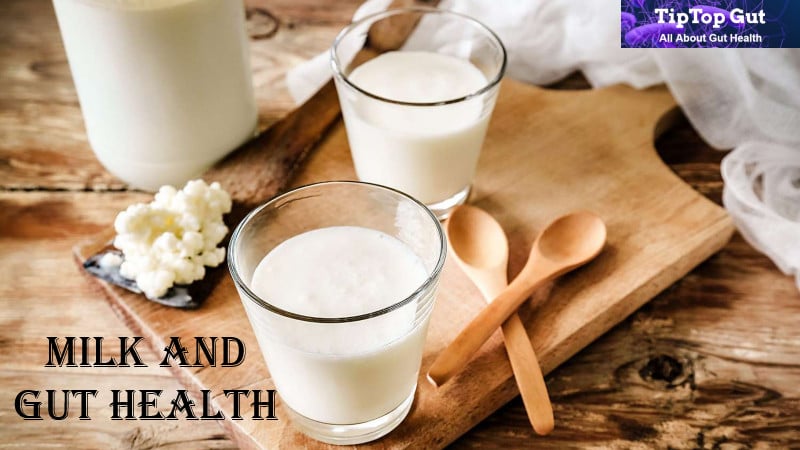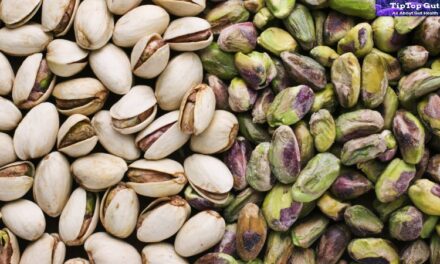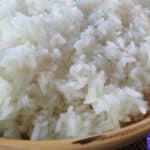A beverage with a real punch is milk. Although it is packed with vitamins and minerals, its best quality is that it tastes great.
Proteins, calcium, and other necessary minerals, including B vitamins, magnesium, potassium, phosphorus, and zinc, are all present in milk, a nutrient-dense diet. Higher diet quality is connected with their consumption.
One of the healthiest beverages in the world is milk. It is an excellent source of high-quality protein and a great source of vitamins and minerals like vitamin B12, calcium, and riboflavin. This may lower blood pressure and lower your risk of osteoporosis.
Regarding gut health, dairy has gotten a lot of conflicting feedback throughout the years. Although dairy can improve your digestive system, it can affect the gut microbiome in some cases. So, is milk good for gut health.
Breast Milk and Infant’s Gut Formation
Research shows that breastfeeding offers many health benefits for infants and mothers and potential economic and environmental benefits for communities.
According to other research, breastfeeding may lower the chance of developing type 2 diabetes, obesity, asthma, and some allergy illnesses. Additionally, it might promote a baby’s cognitive development. However, additional study is required to validate these results.
Each woman and baby require a different combination of nutrients found in breast milk. Prebiotics, which serve as the beneficial bacteria’s “food,” are also present. Even though the milk is incredible, feeding a baby immediately at the breast increases the transfer of healthy organisms.
This is so because the skin around a mother’s areola is where about 10% of the bacteria given to the newborn come from. A beneficial alchemy also occurs with the bacteria and enzymes inside the infant’s mouth, facilitating a healthy oral microbiota in the baby.
The role of the gut microbiota in health and conditions like allergies is supported by evidence. The “window of opportunity” in early childhood, when interventions that change the gut microbiota generate long-term effects, is critical, according to recent studies. The composition of the neonate’s gut microbiota and metabolism may be crucial factors in the likelihood of developing allergy diseases.
By exposing the newborn to the milk microbiota, breastfeeding, directly and indirectly, influences the development of the gut microbiota in young children. These factors include human milk oligosaccharides, secretory IgA, and antimicrobial agents. Breastmilk’s potential to alter a child’s early gut flora makes it a promising approach for preventing allergies.
The majority of the human body is extensively populated with various bacteria, viruses, fungi, protozoa, and parasites. Although the colon has the highest concentration of bacteria, the other gastrointestinal tract regions also contain microbes. The mechanism through which the human gut microbiota develops is quite complex.
Early gut colonization has a lasting effect on the microbiome and is primarily responsible for the differences in the microbiota between people. The microbiota changes over the first three years of life from a relatively simple but quickly expanding diversity to a more complex and stable adult state.
Breast Milk Promotes a Healthy Gut
Breast milk is frequently how we first consume dairy. Infant nourishment comes from breast milk, which also contains a variety of microbiota (good bacteria) that support the development of the gut microbiome. According to studies, good bacteria from the mother’s intestine may pass to a newborn through breast milk.
Furthermore, since the breast tissue contains germs, breastfeeding contributes to the baby’s digestive health. The bacteria transferred from the mother to the child benefit the baby’s immune system and the ecosystem of gut bacteria. Additionally, this lessens the severity of bacterial illnesses in old age.
Read More:
Best Milk for Gut Health: 5 Healthiest Milks for Gut Health
Is Milk Good for Gut Health?
In addition to proteins, calcium, and other vital minerals, including magnesium, potassium, phosphorus, zinc, and B vitamins, milk is regarded as a nutrient-dense diet. Their consumption is linked to better diet quality.
Regarding intestinal health, dairy has gotten a somewhat mixed bag of assessments throughout the years. Dairy might improve digestion, but it can also have a negative impact on the microbes in your gut.
That’s because dairy is typically indigestible by humans. Due to the widespread consumption of cow’s milk throughout the agricultural revolution, some people have genetically modified their ability to digest dairy; nonetheless, 75% of adults worldwide still lack the lactase enzyme required to break down lactose in the body.
Lactose intolerance is what is meant by this. After consuming dairy, lactose-intolerant people frequently experience intestinal problems.
Milk is easily absorbed into our bloodstream since it breaks down into parts. However, if we lack the lactase enzyme or have less of it, it gets tougher to break down lactose into more readily absorbed carbohydrates. Our systems do not have to work more to digest milk than other foods (glucose and galactose).
What is the Best Milk for Gut Health?
For most people, high-quality (where available, raw) cow milk from well-treated cows is the best for intestinal health. Cow milk is the most nutrient-dense option since it has the highest levels of protein, amino acids, and vitamins of all plant-based substitutes.
In fermented milk products, the nutritional value of cow milk is more accessible and easier to digest. Lactose-free organic milk is the most nutrient-dense choice for people who cannot tolerate lactose.
Read More:
Biotics 8 Review: SCAM or A Legit Probiotic for Men?
Reasons to Use Milk for Gut Health
Dairy has a variety of effects on gut health, depending on how milk is consumed and how the gut flora is affected. There is no one-size-fits-all treatment for this problem.
Not all can intake milk, but skipping milk from your diet is not recommended. We have mentioned both cases; either you are allergic form milk or milk suits you, you can see the alternatives.
Vitamin K is an essential vitamin for gut health
The majority of the vitamin K in the human body, which is crucial for human health and notably for blood clotting, is created in the stomach. Reduced-fat or fat-free dairy products contain ∼5–22% of the vitamin K found in full-fat equivalents. A study in 2017 found that dairy products contain high levels of a particular kind of vitamin K called menaquinones.
Full-fat dairy products, particularly soft cheeses, milk and yoghurt, have high concentrations of vitamin K. Consume some of those, in other words, and you’re promoting vitamin K production in your gut and helping your blood clotting.
The majority of people are sensitive to dairy.
A majority of people are sensitive to dairy. This means they cannot digest milk’s proteins (casein and whey) or sugar (lactose). Intestinal distress results if your body is unable to digest them. Dairy consumption over an extended period of time may harm your digestive system.
For people sensitive to gluten, dairy proteins may look very similar to gluten in a process known as “molecular mimicry”. The body may respond to dairy with an inflammatory response similar to that in gluten-sensitive individuals exposed to gluten. Always believe in your body. If you react to dairy or think you are sensitive to dairy, then dairy should be avoided. Remember, if in doubt, leave it out.
Vitamin K is crucial for gut health, heart health, and strong bones and aids in adequately functioning our immune system. We can increase our intake of various foods to ensure we’re receiving enough.
Fragmented Milk to Help Gut health
According to a 2014 Nature study, consuming fermented milk products enhanced gut butyrate production, which is known to improve gut health. It decreased Bilophila wadsworthia bacteria, which has been associated with gastrointestinal problems, including IBS. Dairy products that have been fermented may lessen intestinal sensitivity.
If you enjoy dairy, it’s advisable to concentrate on these components of the dairy product range to support the health of your stomach, according to a study.
What to use if you are lactose intolerant?
Being lactose intolerant does not mean that you must altogether avoid dairy products. Fermented milk might be the ideal remedy for some folks. Probiotics, or living bacteria, are included in fermented milk products like yogurt and kefir, which can help with digestion by encouraging the development of beneficial bacteria in your gut microbiota.
Probiotic cultures may thereby facilitate simpler digestion and absorption of dairy. Additionally, since it has less lactose than conventional milk, fermented milk can be more accessible for people who lack the enzyme lactase to digest.

FAQs about Milk and Gut Health
What milk is best for the gut?
The best milk for gut health is dairy and plant-based milk, which may be good options for those with digestive issues.
- Lactose-Free Milk
- Almond Milk
- Hemp Milk
- Coconut Milk
- Kefir.
Is milk good for digestive problems?
When you consume milk and other foods, digestion will be slowed, lowering your risk of an adverse reaction. Due to either lower lactose content or beneficial bacteria (probiotics) present in these goods, many people with lactose intolerance can enjoy some types of dairy products.
Is milk good for a leaky gut?
Just be sure to avoid dairy products that haven’t been fermented, such as milk and cheese. Other healthy foods to support gut healing include fruits like strawberries, papaya, and blueberries and vegetables like broccoli, carrots, and cabbage.
Does milk cause inflammation in the gut?
Dairy does not typically induce inflammation in most people; thus, avoiding it is unnecessary. Many dairy-containing meals are acceptable as a component of a balanced diet. In addition, many non-dairy, plant-based milk alternatives are on the market for those seeking other options.
What time of day is ideal for drinking milk?
Adults should drink milk at least an hour before bed. Kids should drink milk first thing in the morning. Milk consumption at night encourages “Ojas.” Ojas is referred to be the condition in which appropriate digestion is accomplished.
Concluding Now!
When it comes to dairy intake, moderation may be the key. The best food for the gut microbiota is the “Mediterranean diet,” which emphasizes “olive oil, diverse fruits, vegetables, grains, legumes, and nuts; moderate consumption of fish, chicken, and red wine; and a decreased intake of dairy products, red meat, processed meat, and sweets.”
There is proof that diets heavy in dairy and meat disturb the gut’s delicate balance. You can read here the 60 best foods for gut health and digestion.
Real fermented yogurt, kefir, and cheeses can be part of a healthy diet. After all, while ingesting fermented dairy, people survived thousands of years and developed. These fermented foods can also provide a species-rich dose of probiotics for gut health. You may also read the list of fermented foods for gut health.
For dairy enthusiasts, lactose-free milk products are a good alternative. Lactose-free milk is just regular dairy milk without lactose, as the name implies. That means that people who are lactose intolerant can drink it without worrying about experiencing inconvenient and unpleasant side effects.
In addition to milk, most dairy products—such as sour cream, buttermilk, cheese, ice cream, hot chocolate, and heavy cream—also come in lactose-free varieties.
Read More:
Best Over the Counter Probiotic for Gut Health: Easy Guide 2022
Best Probiotic for Gut Health and Weight Loss: An Ultimate Guide 2022
Best Probiotic for Vaginal and Gut Health: The Best Guide 2022

















